At this point, it sounds like Tom was on the page of crossing his fingers and hoping the movie was as good as the credits. "But then I had super luck," Tom writes. "I reached out to a local crime novelist to introduce it, AJ Devlin, and this was his reply:
Tom himself suggested I interview Devlin. It's a good idea; we embark in a moment (italics are me, non-italics AJ). Of course, AJ have more to say about the film at the ViFF Centre!
We begin with a question about his three novels, Cobra Clutch, Rolling Thunder, and Five Moves of Doom, set respectively in the worlds of pro-wrestling, roller derbies, and mixed martial arts...
I’ve been incredibly fortunate that my neighbour and friend Joel Johnston, a 28 year retired Vancouver Police Department sergeant, MMA and Shotokan Karate practitioner, writer, and Use of Force, Defensive Tactics, Confrontation Management, and Violence Prevention expert — who now runs his own prestigious consulting firm which specializes in training law enforcement in Canada and internationally — has advised on all my books. Joel also took me on a ride-a-long in Vancouver’s Downtown Eastside while still on the force, which was an experience that is still paying dividends to this day as I continue working on my mystery-comedy series.
The professional wrestling scene in Vancouver is great and was very welcoming when I initially reached out to them. As a result, I was able to connect with the likes of ring generals such as “Uncle Daddy” Tony Baroni and “Joshi Slayer” Cat Power, who enthusiastically blurbed Rolling Thunder. Of course now there is NEW (Nation Extreme Wrestling), a relatively recent promotion that has been doing some really exciting things with professional wrestling in the Lower Mainland, including hosting the city’s first ever outdoor wrestling event at Nat Bailey’s Stadium later this month. In the past I’ve even been able to attend some pro wrestling shows as a vendor, including a couple at the Commodore Ballroom, where I was able to meet and greet many local wrestlers while promoting and selling my books.
In terms of marketing to the “sport subcultures” featured in the “Hammerhead” Jed novels, it all starts with making a concerted effort to capture the passion these athletes have for their respective sports. As an aspiring storyteller who grew up loving books and movies that offered escapist entertainment, I like to think I can relate to the feeling of having such potent enthusiasm for something that comes with no guarantee of ever finding success, but you feel compelled to pursue it anyway because you just love it so damn much.
Based upon the feedback I’ve received from people in these athletic subcultures, my efforts to accurately capture the heart of their respective sports seems to be appreciated, which makes me very pleased. Personally, I believe that if someone is going to be generous enough to come on an adventure into my imagination, the least I can try and do is to get the details of these unique worlds right, while simultaneously showcasing the environments in which I set my stories and treating them with the respect that they deserve.
Tell me your history with Leonard Schrader? How did you connect? What did you collaborate on with him (any screenplays that got made?). How did The Yakuza come up between you? Can you track any influences from him into your current writing...?
I first met Leonard Schrader in my senior year at Chapman University, when I was assigned to his Advanced Screenwriting Class. I remember immediately being captivated by his enigmatic energy, tremendous knowledge, and screenwriting stories, so I realized pretty quickly how lucky I was to have the opportunity to study under him. While in Len’s class I began work on a gritty revenge thriller that I would go on to option to a production company, and I guess my love for vengeful stories across all genres like Death Wish, The Crow, and For a Few Dollars More, not to mention novels and comics like The Count of Monte Cristo and The Punisher, came through and caught Leonard’s attention. The next thing I knew the occasional pop-in visit during his office hours turned into weekly hours-long fanboy sessions where we would recount our favourite films and he would regale me with incredible tales not just about his own body of work, but also the films that struck a chord with him growing up and put him on his path to becoming a master storyteller.
The Yakuza was one of the first of Leonard’s film’s that I had ever seen, and unpacking and dissecting the movie with him sort of kick started a joint trip down a crime and noir rabbit hole together. I was fascinated by his time in Japan and affinity for the culture, and while it was something I mostly learned about through Len and later his wife Chieko, the reverence he had for this distinctive style of creative arts was immediately apparent. I suppose I learned to carry that respect for source material with me as I began my writing journey, not to mention that he was a brilliant tactician of the craft of storytelling, whose understanding of narrative structure was so commanding and vast that it never even occurred to me to try and construct a story any other way.
While my time at Chapman University and The American Film Institute was amazing, the cherry on top was without a doubt collaborating with Len outside of the classroom as student and mentor, co-writers, and eventually very close friends. It was during those many late nights at the 101 Diner in Hollywood, which was walking distance from Leonard and Cheiko’s Hollywood Hills home, where he gifted me with the experience of getting to watch him work in real time. Although we wrote several screenplays together, unfortunately none were produced, but for a hungry Canadian ex-jock turned wannabe screenwriter it was the thrill of a lifetime. Having grown up as the son of an Olympian and Canadian basketball star, writing with Leonard felt like the equivalent of getting to play one-on-one regularly with a professional basketball player while chasing your dream. You’re definitely in over your head and going to get schooled by their greatness, but you will learn more than you could ever imagine and pick things up faster than you thought possible just by interacting with someone at that skill level.
Is there a connection between you and Paul Schrader? The title Rolling Thunder of course connects with a screenplay he co-authored... just a coincidence?
The connection between Paul Schrader and myself is just that we both loved his brother and, in Paul’s own words that he spoke at the memorial, he also considered himself a student of Leonard's. I was able to meet Paul because I had the honour of being tasked to speak at Len’s service, but definitely did so through the prism of being wide-eyed and wet-behind-the-ears wannabe scribe. Nevertheless, like many of Len’s protegés, his guidance, wisdom, and wit have stayed with me long since our time together.
The Rolling Thunder connection is kind of funny in that there’s no real connection at all — other than the fact that it was one of Leonard and I's* favourite films that Paul wrote. Since I had conceived of “Hammerhead” Jed being a pro-wrestler PI who is drawn into cases set against the backdrop of fringe sports and / or unique subcultures, I had always planned on spinning off a lady wrestler character from my debut novel and her being the link that bring’s my sleuth into the roller derby world for the sequel. Throw in the fact that “Rolling Thunder” is also the name of an aggressive aerial move popularized by ECW and WWE legend Rob Van Dam, and that like all the wrestling move titles in my series it doubles as a metaphor for where my detective is in terms of his character arc, it seemed like a no brainer to use it for the title of the sequel as well as serving as a little nod to my late professor and the Schrader cinematic legacy.
Any past encounters with Japanese culture, the Yakuza, or Yakuza cinema? Any interest in doing something centered around a Japanese sport like sumo?
I have no experience with nor have I ever been involved in the writing or development of any Yakuza movies or stories, or anything remotely related to Japan. Perhaps I instinctively knew that anything I even attempted to come up with would pale in comparison to what the Schrader brothers had created so there was no point and I had nothing in particular that I wanted to say. However, when I took Len’s teachings and began to apply them to an idea for a narrative that explored athletics, something that had been such a huge part of my life until I hung up my sneakers and moved to Southern California for film school, I really felt like I was onto something and that was definitely the beginning of the “Hammerhead” Jed mystery-comedy series.
While far from an expert on Japanese cinema or Yakuza flicks, there are several films of which I am a big fan — including Shogun Assassin, which was co-developed by David Weisman, Leonard’s frequent collaborator and Academy-Award nominated producer of Kiss of the Spider Woman (for which Len was nominated for an Oscar as well for Best Adapted Screenplay), the Schrader brothers second Japanese film Mishima: A Life in Four Chapters and, of course, Kurosawa’s Yojimbo, which was the basis for The Man With No Name Spaghetti Western trilogy, and possibly my favourite film of all time, The Good, the Bad and the Ugly.
That being said, now that you’ve suggested it, how could I not consider sumo wrestling as the foundation for a future mystery? Jed’s sidekick — his ex-IRA operative cousin Declan who tends to get too much enjoyment out of often tagging along into these atypical athletic environments — would certainly have a blast should it come up in another novel down the line.
Any other angles we should explore - connections with the cinema of Sydney Pollack or Robert Mitchum?
No history to speak of with Sydney Pollack or Robert Mitchum, although Leonard and I were both particularly big fans of the latter’s chilling and riveting performance as a serial killing preacher in The Night of the Hunter. As he was raised in a strict Dutch Calvinist household, I think the overarching religious themes had particular relevance for Len, and I know for myself I was fascinated by a story featuring such a heinous and villainous main character the likes I had rarely seen before.
I do have other fringe or unconventional sports I’m hoping to explore in future novels, but am also very much looking forward to delving into more unique subcultures as well, some that are completely outside of the world of athletics. I definitely dabble in these circles in Rolling Thunder and Five Moves of Doom, and have even begun flirting with taking “Hammerhead” Jed away from Vancouver — which up until now has been pretty intrinsic to the series — and putting him in less familiar but hopefully still engaging and entertaining surroundings as I continue to try and find new and fun ways to challenge my grappling gumshoe.
Thanks, AJ! See you Thursday. People wishing to see The Yakuza as introduced by AJ Devlin can purchase tickets here! (A mere $10 each, and there may still be series passes available, with lots of movies left in the series to make it worth your while, if you go to a bunch).
*AJ had written "Leonard and mine's favourite films" which doesn't work, but my alteration might not fix it either! You know that you're in trouble when you find yourself on Stack Exchange, trying to sort out niceties of grammar, but "Leonard's and my favourite films" - which would seem to be the preferred variant - just seems wrong to me, so I am opting for something that colloquially feels correct, without being secure what the "correct" variant is. Someone maybe ask Ken Eisner?**
**No, don't, that is a joke offered for the amusement of Tom Charity and Graham Peat alone. I hope I made them spit some coffee. If you don't get it, don't worry about it. Peace!
This is almost serendipitous for me — Leonard Schrader (Paul’s brother) came up with the idea for The Yakuza while teaching abroad in Japan in the late sixties and early seventies. Len was also my late professor, mentor, and great friend. I studied under him for years, we wrote numerous screenplays together, and he and his wife Chieko (who passed herself in recent years) used to refer to me as their “literary son” since we were so close and they never had children themselves.
I even had the honour and privilege of dedicating my Crime Writers of Canada 2019 Best First Novel winning debut Cobra Clutch to Len’s memory.
As a result, I happen to have a great deal of little known insight about the Schrader brothers writing The Yakuza together and its journey to the silver screen so if that movie is still available I think I would be uniquely suited to introduce it (and I can keep it to a tight five minutes or whatever time is allotted). Sam Wiebe is also a friend so it would be fun to introduce a film the same night as him. [Wiebe will be introducing another great 70's thriller, Night Moves].
Finally, I also appeared as a special guest on a podcast discussing this film back in 2020 when I was promoting Rolling Thunder the second book in my “Hammerhead” Jed pro-wrestler PI mystery-comedy series. [Rolling Thunder is also the title of a film co-written by Paul Schrader] Here is the link if you are curious:
Tom himself suggested I interview Devlin. It's a good idea; we embark in a moment (italics are me, non-italics AJ). Of course, AJ have more to say about the film at the ViFF Centre!
We begin with a question about his three novels, Cobra Clutch, Rolling Thunder, and Five Moves of Doom, set respectively in the worlds of pro-wrestling, roller derbies, and mixed martial arts...
AM: How do you research your novels? For Rolling Thunder, did you decide on the topic then start going to roller derbies, or were you already involved...? Do you ever try the sports in question - have you ever wrestled or done MMA?
AJ: I like to research my novels as old school as possible, which means I enjoy getting out there to the events and seeing them in person. I’ll never forget my first independent wrestling show at a Russian Community Centre in Kitsilano. It was a pretty bare bones facility, quite dated, with old school parquet flooring and the scent of stale popcorn and butter lingering in the air. Needless to say both of those details made it into my first novel Cobra Clutch, in which my pro-wrestler turned PI “Hammerhead” Jed Ounstead is forced to revisit his roots in sports entertainment while honouring a debt owed to his former tag-team partner Johnny Mamba, whose precious pet snake and ringside gimmick has been stolen and held for ransom.
AJ: I like to research my novels as old school as possible, which means I enjoy getting out there to the events and seeing them in person. I’ll never forget my first independent wrestling show at a Russian Community Centre in Kitsilano. It was a pretty bare bones facility, quite dated, with old school parquet flooring and the scent of stale popcorn and butter lingering in the air. Needless to say both of those details made it into my first novel Cobra Clutch, in which my pro-wrestler turned PI “Hammerhead” Jed Ounstead is forced to revisit his roots in sports entertainment while honouring a debt owed to his former tag-team partner Johnny Mamba, whose precious pet snake and ringside gimmick has been stolen and held for ransom.
I’ve been incredibly fortunate that my neighbour and friend Joel Johnston, a 28 year retired Vancouver Police Department sergeant, MMA and Shotokan Karate practitioner, writer, and Use of Force, Defensive Tactics, Confrontation Management, and Violence Prevention expert — who now runs his own prestigious consulting firm which specializes in training law enforcement in Canada and internationally — has advised on all my books. Joel also took me on a ride-a-long in Vancouver’s Downtown Eastside while still on the force, which was an experience that is still paying dividends to this day as I continue working on my mystery-comedy series.
With my sequel Rolling Thunder, I wanted to showcase roller derby and was able to get out to some games before COVID shut such gatherings down. Just like indie wrestling, roller derby is something that needs to be experienced to do it justice. And as luck would have it I also went to high school with Jenna Hauck — aka “Hydro-Jenna Bomb” — a former Vancouver roller derby star turned journalist who not only gave me invaluable insight into the derby world, but also generously did an edit of the book herself which was key in getting a lot of the details of such a badass, renegade, and counter-culture sport accurate.
For my most recent novel Five Moves of Doom, Crime Writers of Canada member and veteran jack of all trades promoter Bob Harris kindly put me in touch with legendary local fight promoter Gerry Gionco, who in addition to my police officer / mixed martial artist friend Joel, provided some essential feedback on not just the fight scenes I had written but also the MMA lifestyle.
Finally, with regards to the sports in question, I do have some experience with wrestling and MMA. As a teenager, I spent several summers in SFU freestyle wrestling camps, wrestled in high school, trained in Judo, and then later in university took an Aikido class, which is a Japanese martial art which focuses on holds, throws, and using your opponent’s own movements against them. So it’s safe to say the limited combat training I have received is definitely wrestling-based, which likely played a role in my decision to craft a squared circle sleuth as my series protagonist.
How have people on the wrestling scene in Vancouver responded to your novels? Do you do anything to market your novels within the "sport subcultures" involved?
For my most recent novel Five Moves of Doom, Crime Writers of Canada member and veteran jack of all trades promoter Bob Harris kindly put me in touch with legendary local fight promoter Gerry Gionco, who in addition to my police officer / mixed martial artist friend Joel, provided some essential feedback on not just the fight scenes I had written but also the MMA lifestyle.
Finally, with regards to the sports in question, I do have some experience with wrestling and MMA. As a teenager, I spent several summers in SFU freestyle wrestling camps, wrestled in high school, trained in Judo, and then later in university took an Aikido class, which is a Japanese martial art which focuses on holds, throws, and using your opponent’s own movements against them. So it’s safe to say the limited combat training I have received is definitely wrestling-based, which likely played a role in my decision to craft a squared circle sleuth as my series protagonist.
How have people on the wrestling scene in Vancouver responded to your novels? Do you do anything to market your novels within the "sport subcultures" involved?
The professional wrestling scene in Vancouver is great and was very welcoming when I initially reached out to them. As a result, I was able to connect with the likes of ring generals such as “Uncle Daddy” Tony Baroni and “Joshi Slayer” Cat Power, who enthusiastically blurbed Rolling Thunder. Of course now there is NEW (Nation Extreme Wrestling), a relatively recent promotion that has been doing some really exciting things with professional wrestling in the Lower Mainland, including hosting the city’s first ever outdoor wrestling event at Nat Bailey’s Stadium later this month. In the past I’ve even been able to attend some pro wrestling shows as a vendor, including a couple at the Commodore Ballroom, where I was able to meet and greet many local wrestlers while promoting and selling my books.
In terms of marketing to the “sport subcultures” featured in the “Hammerhead” Jed novels, it all starts with making a concerted effort to capture the passion these athletes have for their respective sports. As an aspiring storyteller who grew up loving books and movies that offered escapist entertainment, I like to think I can relate to the feeling of having such potent enthusiasm for something that comes with no guarantee of ever finding success, but you feel compelled to pursue it anyway because you just love it so damn much.
Based upon the feedback I’ve received from people in these athletic subcultures, my efforts to accurately capture the heart of their respective sports seems to be appreciated, which makes me very pleased. Personally, I believe that if someone is going to be generous enough to come on an adventure into my imagination, the least I can try and do is to get the details of these unique worlds right, while simultaneously showcasing the environments in which I set my stories and treating them with the respect that they deserve.
Leonard Schrader
Tell me your history with Leonard Schrader? How did you connect? What did you collaborate on with him (any screenplays that got made?). How did The Yakuza come up between you? Can you track any influences from him into your current writing...?
I first met Leonard Schrader in my senior year at Chapman University, when I was assigned to his Advanced Screenwriting Class. I remember immediately being captivated by his enigmatic energy, tremendous knowledge, and screenwriting stories, so I realized pretty quickly how lucky I was to have the opportunity to study under him. While in Len’s class I began work on a gritty revenge thriller that I would go on to option to a production company, and I guess my love for vengeful stories across all genres like Death Wish, The Crow, and For a Few Dollars More, not to mention novels and comics like The Count of Monte Cristo and The Punisher, came through and caught Leonard’s attention. The next thing I knew the occasional pop-in visit during his office hours turned into weekly hours-long fanboy sessions where we would recount our favourite films and he would regale me with incredible tales not just about his own body of work, but also the films that struck a chord with him growing up and put him on his path to becoming a master storyteller.
The Yakuza was one of the first of Leonard’s film’s that I had ever seen, and unpacking and dissecting the movie with him sort of kick started a joint trip down a crime and noir rabbit hole together. I was fascinated by his time in Japan and affinity for the culture, and while it was something I mostly learned about through Len and later his wife Chieko, the reverence he had for this distinctive style of creative arts was immediately apparent. I suppose I learned to carry that respect for source material with me as I began my writing journey, not to mention that he was a brilliant tactician of the craft of storytelling, whose understanding of narrative structure was so commanding and vast that it never even occurred to me to try and construct a story any other way.
While my time at Chapman University and The American Film Institute was amazing, the cherry on top was without a doubt collaborating with Len outside of the classroom as student and mentor, co-writers, and eventually very close friends. It was during those many late nights at the 101 Diner in Hollywood, which was walking distance from Leonard and Cheiko’s Hollywood Hills home, where he gifted me with the experience of getting to watch him work in real time. Although we wrote several screenplays together, unfortunately none were produced, but for a hungry Canadian ex-jock turned wannabe screenwriter it was the thrill of a lifetime. Having grown up as the son of an Olympian and Canadian basketball star, writing with Leonard felt like the equivalent of getting to play one-on-one regularly with a professional basketball player while chasing your dream. You’re definitely in over your head and going to get schooled by their greatness, but you will learn more than you could ever imagine and pick things up faster than you thought possible just by interacting with someone at that skill level.
Is there a connection between you and Paul Schrader? The title Rolling Thunder of course connects with a screenplay he co-authored... just a coincidence?
The connection between Paul Schrader and myself is just that we both loved his brother and, in Paul’s own words that he spoke at the memorial, he also considered himself a student of Leonard's. I was able to meet Paul because I had the honour of being tasked to speak at Len’s service, but definitely did so through the prism of being wide-eyed and wet-behind-the-ears wannabe scribe. Nevertheless, like many of Len’s protegés, his guidance, wisdom, and wit have stayed with me long since our time together.
The Rolling Thunder connection is kind of funny in that there’s no real connection at all — other than the fact that it was one of Leonard and I's* favourite films that Paul wrote. Since I had conceived of “Hammerhead” Jed being a pro-wrestler PI who is drawn into cases set against the backdrop of fringe sports and / or unique subcultures, I had always planned on spinning off a lady wrestler character from my debut novel and her being the link that bring’s my sleuth into the roller derby world for the sequel. Throw in the fact that “Rolling Thunder” is also the name of an aggressive aerial move popularized by ECW and WWE legend Rob Van Dam, and that like all the wrestling move titles in my series it doubles as a metaphor for where my detective is in terms of his character arc, it seemed like a no brainer to use it for the title of the sequel as well as serving as a little nod to my late professor and the Schrader cinematic legacy.
Any past encounters with Japanese culture, the Yakuza, or Yakuza cinema? Any interest in doing something centered around a Japanese sport like sumo?
While far from an expert on Japanese cinema or Yakuza flicks, there are several films of which I am a big fan — including Shogun Assassin, which was co-developed by David Weisman, Leonard’s frequent collaborator and Academy-Award nominated producer of Kiss of the Spider Woman (for which Len was nominated for an Oscar as well for Best Adapted Screenplay), the Schrader brothers second Japanese film Mishima: A Life in Four Chapters and, of course, Kurosawa’s Yojimbo, which was the basis for The Man With No Name Spaghetti Western trilogy, and possibly my favourite film of all time, The Good, the Bad and the Ugly.
That being said, now that you’ve suggested it, how could I not consider sumo wrestling as the foundation for a future mystery? Jed’s sidekick — his ex-IRA operative cousin Declan who tends to get too much enjoyment out of often tagging along into these atypical athletic environments — would certainly have a blast should it come up in another novel down the line.
Any other angles we should explore - connections with the cinema of Sydney Pollack or Robert Mitchum?
No history to speak of with Sydney Pollack or Robert Mitchum, although Leonard and I were both particularly big fans of the latter’s chilling and riveting performance as a serial killing preacher in The Night of the Hunter. As he was raised in a strict Dutch Calvinist household, I think the overarching religious themes had particular relevance for Len, and I know for myself I was fascinated by a story featuring such a heinous and villainous main character the likes I had rarely seen before.
Do you know what sport culture your next novel will be set in?
Thanks, AJ! See you Thursday. People wishing to see The Yakuza as introduced by AJ Devlin can purchase tickets here! (A mere $10 each, and there may still be series passes available, with lots of movies left in the series to make it worth your while, if you go to a bunch).
*AJ had written "Leonard and mine's favourite films" which doesn't work, but my alteration might not fix it either! You know that you're in trouble when you find yourself on Stack Exchange, trying to sort out niceties of grammar, but "Leonard's and my favourite films" - which would seem to be the preferred variant - just seems wrong to me, so I am opting for something that colloquially feels correct, without being secure what the "correct" variant is. Someone maybe ask Ken Eisner?**
**No, don't, that is a joke offered for the amusement of Tom Charity and Graham Peat alone. I hope I made them spit some coffee. If you don't get it, don't worry about it. Peace!

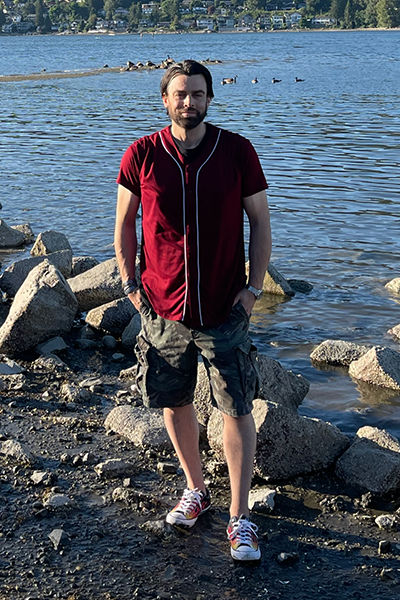

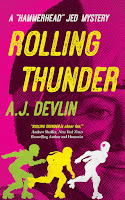

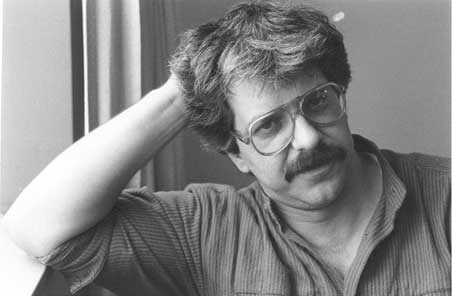

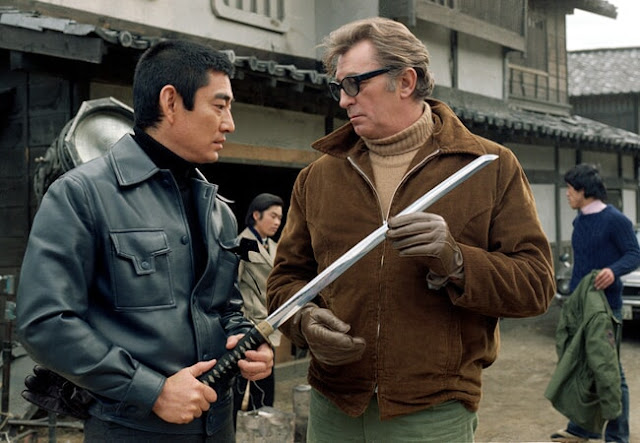
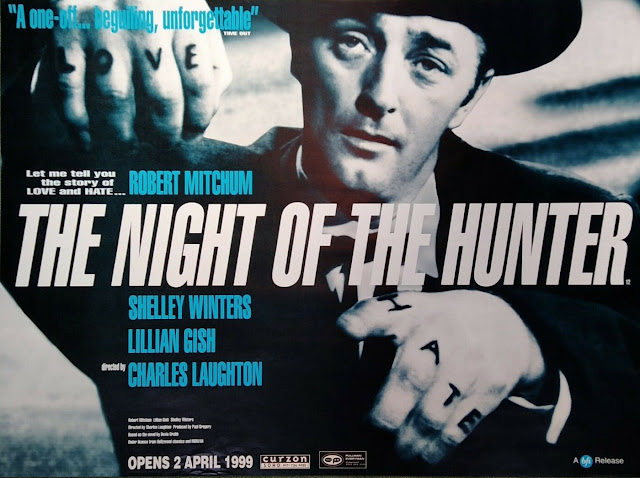
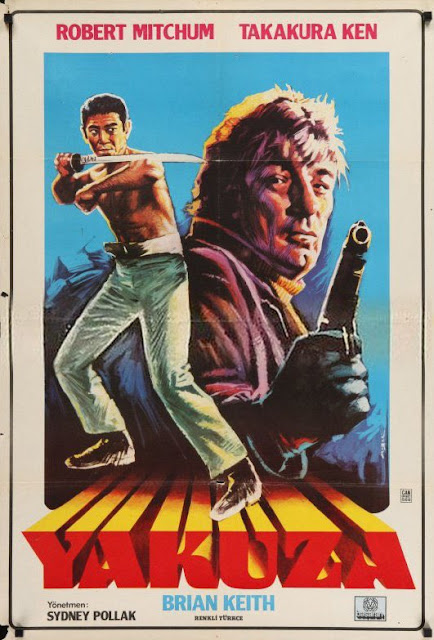
No comments:
Post a Comment